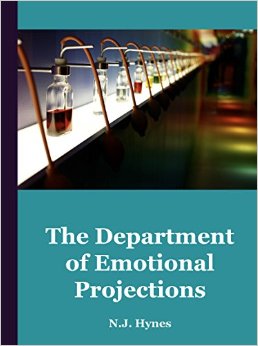NJ Hynes’ debut collection won the inaugural Live Canon First Collection Prize and was published in 2014. Full disclosure: I too have been in Live Canon anthologies and contributed to their installation Health Tips For The Year Ahead in 2012, but have not met her personally.
She writes poems that are in turns regular and free, dipping in and out of form with assured ease. At the heart of this collection are the six eponymous sonnets: written mostly in iambic pentameters, each numbered and progressing into increasingly tighter rhyme schemes as the narrative circles from a chillingly dispassionate third-person:
‘Her first appointment is at half past four.’ (TDoEP 1)
into first person immediacy and dismay:
‘Why did I let him? How could I be blind
to his intention, the treatment’s steady creep
along my pillow, eating away at you?’ (TDoEP 6)
The six-poem cycle is the poetic equivalent of The Matrix meets Eternal Sunshine of the Spotless Mind, implying a futuristic technology that induces a virtual reality preferable to your current real one. Sometimes there is a glitch in the system, as in TDoEP 3:
‘wait, when did that stout man arrive?
The simulation didn’t mention him:
… Someone selected Touch
the Holy Face of Him and our orders crossed.
Now they have my ants and I their god.’
In String Theory for Emily Dickinson, she riffs on Dickinson’s distinctive style (and particularly the subject matter of Because I Could Not Stop For Death) in an impressively accurate way, neatly incorporating subatomic theoretical physics into three perfectly controlled stanzas:
‘I’ll fill my bait box with dark matter,
Cast small nets to sea –
I’ll know if strings are stronger when
We meet infinity.’
There is simplicity to be found in some of her less obviously structured poems. For instance, Offshore Liquidity shimmers with internal rhymes and deft use of alliteration. If one were to bandy the term ‘sonnet’ about with ease, one might call it a sonnet. There are certainly fourteen lines, ending with a rhyming couplet. But this is a wholly modern take on the form, and I reserve a reader’s right to enjoy the playful imagery without worrying about the kind of dry analysis that put us all off poetry at school. It may be that this collection wears its considerable learning very lightly indeed, to magical effect.
‘Some days I prefer the gentle
lap lapping of the sea,
not the one hand clapping
of a stream over a boulder
but the precise dipping
of a cat’s tidy tongue,
a sipping so melodic
and consistent you forget
that something so insistent
easily gets out of hand, and
don’t notice as the water curls
around your striped canvas chair,
lifting it up – the only dry land
now a distant line of silent sand.’
A couple of poems explore music. A Multiple Bar Rest meditates on how unplayed, wrapped up instruments might feel, who ‘can’t remember their initials or family names’, but ends confessing ‘how nice it is, really, not to have an audience.’ In Recital, there is almost a synesthete’s imagination of how music might manifest itself: ‘the notes … form ice crystals / that will surely melt at my touch / if they stop spinning long enough.’
Subjects jump. The vast scale of a world is a few pages away from a poem observing a single orange. Ode to a Flat Earth fires up with the provocative ‘I’m bored by infinity.’ Twelve lines later, Hynes has conjured dragons, waterfalls, day-trippers and pilgrims, ending with a fierce yearning for definition: ‘ … I might see the finite edge of things, / a life held to a world that refuses to curve.’ On Shaftesbury Avenue compresses our gaze onto an orange and its charmed, temporary survival on a busy road: ‘ … for a moment / the world rolled over it without harm – / the longer it lasted, the more I believed.’
The Department of Emotional Projections is, refreshingly, a collection rather than a book of linked poems which seems in vogue today, and probably easier to sell. You can dip into a collection: most of the poems are independent beings that can answer your mood. I love its variety and scope, and the feeling of being well-travelled by the end. An impressive debut indeed.
Isabel Rogers’ work has been published in various places including Poetry Wales, Mslexia and Under the Radar. She won the 2014 Cardiff International Poetry Competition.
Order your copy of NJ Hynes’ The Department of Emotional Projections here

